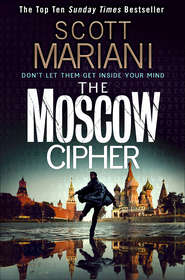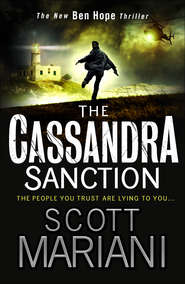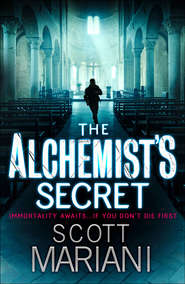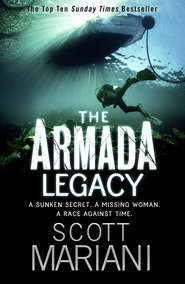По всем вопросам обращайтесь на: info@litportal.ru
(©) 2003-2024.
✖
The Ben Hope Collection: 6 BOOK SET
Автор
Год написания книги
2018
Настройки чтения
Размер шрифта
Высота строк
Поля
As the Audi sped away through the derelict farm with Clément stuffed in the trunk, flames were already appearing at the barn windows and black smoke billowed into the sky.
Monique Banel was walking through the Parc Monceau with her five-year-old daughter Sophie. Monceau was a pleasant little park, with a peaceful atmosphere where the birds sang in the trees, swans paddled in the picturesque miniature lake and Monique liked to unwind for a few minutes after she finished her part-time secretarial work and went to pick Sophie up from her kindergarten. Monique said a cheerfully polite ‘Bonjour, monsieur to the elegant old gent who was often sitting on the same bench around this time reading his paper.
The little girl, as always, was full of attention for all the sights and sounds of the park, her bright eyes sparkling with joy. As they walked down one of the paths that wound between the park’s lawns, Sophie exclaimed in delight, ‘Maman! Look! A little dog’s coming to see us!’ Her mother smiled. ‘Yes, isn’t he pretty?’
The dog was a small neat spaniel, a King Charles Cavalier, white with brown patches and wearing a little red collar. Monique looked about. His owner must be somewhere nearby. Many Parisians brought their dogs here for a walk in the afternoon.
‘Can I play with him, Maman?’ Sophie was ecstatic as the little spaniel trotted up towards them. ‘Hello, doggie,’ the child called out to it. ‘What’s your name? Maman, what’s that in his mouth?’
The little dog reached them and dropped the object it had been carrying on the ground at Sophie’s feet. It looked up at her expectantly, tail wagging. Before her mother could stop her, the child had bent down and picked up the thing and was examining it curiously. She turned to Monique with a frown, holding the object up to show her.
Monique Banel screamed. Her little girl was clutching part of a severed, mutilated human hand.
25 (#ulink_b3495260-0c57-5a07-89a4-10ec3a743528)
Montpellier, France
The electrician’s apprentice couldn’t get the cellar out of his mind. He kept thinking about the strange things he’d seen. What went on there? It wasn’t a storage place. They definitely didn’t keep dogs there. There were bars, like the bars of cages, and rings on the walls. He thought about what he’d been reading in his book about castles in olden days. The modern, glass-fronted building was no castle–but that cellar looked like some kind of weird dungeon to him.
He’d finished work at 6.30 and now he was free till Monday. Thank Christ. Uncle Richard was a nice enough guy–most of the time anyway–but the job was boring. Uncle Richard was boring. Marc wanted a more exciting life. His mother was always telling him he had an overactive imagination. It was all very well wanting to be a writer, but imagination was never going to bring in any money. A good trade–like an electrician–that was the way to go. He didn’t want to end up like his father, did he? Always broke, a gambler, a lowlife who was in and out of prison all the time, who’d run out on his family because he couldn’t bear any responsibility? To be like Uncle Richard–settled, respectable, with a new car every couple of years, a mortgage, membership at the local golf club, a devoted wife and two kids–that was the life his mother had in mind for him, and nothing less would do.
But Marc wasn’t so sure he wanted to end up like either of the brothers. He had his own ideas. If he couldn’t be a writer, maybe he could be a detective. He was fascinated by mysteries, and he was pretty sure he’d found one.
He kept going back to the drawer in his bedside table, where he’d hidden the thing he’d found in the cellar. He hadn’t told anyone about it. It looked like it might be gold. Did that make him a thief, like his father? No, he’d found it, it was his. But what did it mean? What was that place?
He finished his evening meal, dutifully loaded his plate and cutlery in the dishwasher and headed for the door, grabbing his crash helmet and moped keys off the stand in the hallway. He threw a torch into a bag, slung it over his shoulder, then as an afterthought dropped a small bar of Poulain chocolate in there as well.
‘Marc, where are you going?’ his mother called after him.
‘Out.’
‘Out where?’
‘Just out.’
‘Well, don’t be late.’
The place was pretty much within easy moped range, about fifteen kilometres away. After a few false starts and wrong turns, Marc found himself at the walled gateway to the building as night was beginning to fall. The tall black iron-barred gates were shut. Peering between them he could see the lit-up building in the distance among the dark, whispering trees. He killed the whirring moped engine and found a place across the other side of the road where he could tuck the lightweight bike away under some bushes.
The stone perimeter wall ran in a wide curve away from the roadside. He scrambled up an earth bank and followed its line, tramping through long grass, until he came to an old oak tree whose branches overhung the top of the wall. He slung his bag over his shoulder, shinned up the trunk and edged out along one of the thicker branches until he could get one foot on the top of the wall, then the other. He dangled his legs down the other side and dropped lightly into the bushes inside the grounds of the centre.
For a while he stood around under some trees, munching on his bar of chocolate and watching the building. The windows on the ground floor were lit up. He finished his chocolate, wiped his mouth and sneaked across the lawns, keeping to the shadowy bits. He reached the building. The ground-floor windows were too high to see in. A flight of steps led up to what looked like the front door, on the first floor. If he went halfway up them, he’d be able to see through those lit windows.
Just as he was starting up the steps, headlights appeared at the top of the drive. The iron gates whirred automatically open and two big black cars came purring down towards the building. They swept past him and turned a corner. Marc went after them, keeping in the shadows. He saw the cars go down a ramp, their engine noise suddenly amplified in an underground space. He crept around the corner, watching. He could hear doors slamming, and voices echoing. He tiptoed furtively down the ramp until, crouching low, he could see the men getting out of the cars and walking towards a lift.
But something was wrong. One of the men didn’t seem to want to go with the others. In fact he seemed very unwilling indeed. He was being dragged by the arms, yelling and shouting in fear. To Marc’s horror, another man took out a gun. He thought he was going to shoot the frightened man, but instead he hit him over the head with it. Marc saw blood splatter on the concrete. The man was half unconscious now, not protesting any more as his captors dragged him along and his feet trailed on the ground.
Marc had seen enough. He turned and ran.
Straight into the grasping hands of the tall man in black.
26 (#ulink_f485ca03-3609-5dd4-9aa1-5ae9344354ce)
Central Paris
Flann O’Brien’s pub is an oasis of Irish music and Guinness just around the corner from the Louvre museum, not far from the Seine. At 11.27 that night, following the specific instructions they’d received from an email from the unexpectedly alive and kicking Michel Zardi, four men entered the pub. Glancing around them, they approached the bar, which was thronging with people. The pub was filled with raucous laughter, clinking glasses and the sound of fiddles and banjos.
The leader of the four men was stocky and muscular with a bald head, wearing a black leather jacket. He leaned across the bar and spoke to the large, bearded barman. The barman nodded, reached under the bar and took out a mobile phone. He handed it to the bald man, who signalled to his friends and led them back outside into the street.
At exactly 11.30 the phone rang. The bald man answered.
‘Don’t speak’, said the voice on the other end. ‘Listen to what I say, and follow my instructions exactly to the letter. I’m watching you’.
The bald man looked up and down the street. ‘Don’t look for me,’ the voice in his ear said. ‘Just listen. One false move and the deal’s off. You lose the American and you’ll be punished’.
‘OK, I’m listening,’ the bald man replied.
‘Use this phone to call a cab,’ Ben said on the other end as he sat behind the wheel of the Peugeot 206 half a mile away across Paris. ‘Go alone, repeat, go alone or the woman runs. When you’re in the taxi, dial “Zardi” and I’ll tell you where to go.’
The bald man sat in the Mercedes cab as his African taxi driver drove him along the quayside by the river Seine. Away from the brightly illuminated pleasure-boats and the parties of drinkers and tourists, the taxi turned off and took a route down a dark narrow road that led to the shadowy bank of the river. The bald man stepped out, still clutching the mobile phone. The taxi pulled away.
The bald man’s footsteps echoed under the dark overhead bridge as he neared the rendezvous point he’d been given. He glanced around him.
‘Ben, I’ve got a bad feeling about this,’ she whispered in the darkness. ‘You sure this was such a good idea?’ The moonlit river Seine rippled and gurgled beside them. Down below street level, the rumble of the city seemed muted and far away. In the distance, Notre Dame cathedral towered, gold-lit, over the water. He checked his watch. ‘Relax.’
A door slammed on the street above them, a car pulling away, footsteps. She turned to see a figure approaching. ‘Ben, there’s…’
‘Now listen,’ he said softly in her ear. ‘Just trust me here. It’ll be all right.’ He took her arm and led her out from under the shadows of the bridge as the bald man approached. A twisted smile appeared on the man’s face. ‘Zardi?’ he asked, his voice echoing under the stone arch.
‘C’est moi,’ said Ben. ‘Vous avez l’argent?’
‘The money’s in here,’ the bald man replied in French. He held up a briefcase.
‘Set it down on the ground,’ Ben commanded. The bald man gently laid the case down. He looked away from Ben for a second. Ben let go of Roberta’s arm and moved towards him fast. He grabbed the man by the wrist, twisted him round and then the cold steel of the Browning’s silencer was pressing against the man’s crinkly neck. ‘Down on your knees.’
Roberta stared in horror at the pistol in Ben’s hand. She wanted to run, but her legs wouldn’t move and she stood there frozen, unable to take her eyes off Ben as he shoved the gun against the back of the man’s head and began to frisk him. Ben’s gaze flicked momentarily to the expression on her face and he knew what she was thinking. He gave her a look that said just let me deal with this.
The bald man had come ready. There was a Glock 19 in his leather jacket. Ben kicked it across the ground and it slipped over the edge of the riverbank with a soft splash.
‘You’ll die for this, Zardi,’ the bald man muttered.
‘Are you Saul?’ Ben asked.
The bald man wasn’t talking. Ben brought the butt and trigger guard of the pistol down on his head. ‘Are–you–Saul?’ he repeated deliberately. The man whimpered and a trickle of blood ran down his shiny scalp.
Roberta looked away.
‘No,’ the bald man said. ‘I’m not Saul.’











